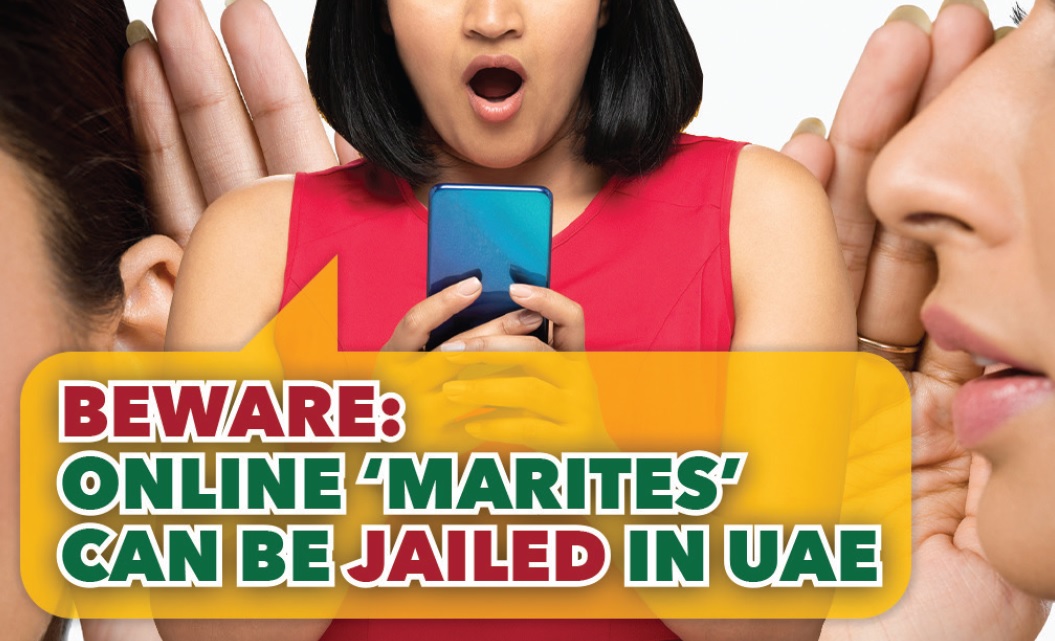Street gossipers have taken a digital leap. In the Philippines, they have acquired a fitting name for themselves—‘Marites’.
A distant cousin of Mosang (also known as chismosa), Marites takes to social media to relay the “hottest tea” of the day.
Thanks to Filipinos’ creativity and great sense of humor, they were able to invent the term Marites, which is short for ‘Mare, ito ang latest’ (Mare, here’s the latest). The term is also often associated with online rumormongers with a sharp pair of eyes and ears for the latest scoops and updates about other people’s lives.
While many people find Marites a source of comic relief, sharing false information, exposing a person’s identity or revealing police activities online are not being taken lightly in the UAE. The habit of unwittingly sharing sensitive messages, photos/videos, or information on the Internet is a serious legal offense here and awaits a stiff fine and punishment.
Such was the recent case of seven individuals who shared a video of an operation of Dubai Police online. They were immediately traced, arrested and referred to competent authorities for legal action.
Then, last June 2022, a video of several expats fighting inside a mall in Ras Al Khaimah went viral and the person behind the camera was also arrested.
“The person who filmed the [altercation] and posted it on social media was also arrested, and everyone was referred to the public prosecution. Ras Al Khaimah Police have repeatedly warned not to disturb public order, public etiquette, or the privacy of life, to start quarrels, nor publish and circulate videos as it is considered a violation of privacy, defamation, and violation of public etiquette,” read Ras Al Khaimah Police statement.
In another case, a similar sneaky video made headlines in May 2019. In a Dubai car park, a woman driver was refusing to pay parking fees that a hotel valet was demanding. To compel the woman to pay, the valet climbed on to the car bonnet. Undeterred, the woman stepped on the accelerator and drove off. The valet had to jump off the car. The witness of the crime was arrested after uploading a recorded video of the incident online.
Be safe than sorry
These incidents show that jail awaits people who fail to understand the legal consequences of their illegal social media activities.
The UAE Cybercrime Law covers a range of offenses, and if there’s a complaint, police action is immediate. Anyone convicted under this law could be penalized with lengthy prison terms and heavy fines of up to Dhs3 million. Authorities advise everyone to remember that what passes for a squabble in the real world could carry grave consequences when conducted on social media.
Colonel Faisal Al Qasim, Director of Security Media at Dubai Police, said that as per Article 21 of the UAE Cybercrime Law, any person who misused technology to breach the privacy of others could be sentenced to jail for six months and/ or a fine of Dhs150,000-Dhs500,000.
“It is a criminal offence in the UAE to record people without their knowledge and publish their images on social media or websites. One should not send videos to relatives or friends, even in good faith, so as not to be held legally accountable. Exchanging videos or pictures can cause harm to others and destroy their reputation,” Al Qasim said.
Marites’ siblings watch out
The UAE Cybercrime Law is on the lookout not only for online Marites, but also for his/her siblings whose day cannot begin and end without spreading or consuming rumors. They are the following:
Marietta, which means ‘Mare, ito pa’ (Girl, here’s more). This person always has a follow up to a story.
Marisol, which means ‘Mareng taga-sulsol’ (provoker). This person loves to add fuel to the fire by adding more unfounded, controversial information to gossip.
Marissa, which means ‘Mare, isa pa’ (Girl, there’s more). This is the person who shares new information as soon as it is discovered by the Marites of cyberspace.
Marina, which means ‘Mare, ano na?’ (Girl, what now?). This person always asks about the latest development in a story.
Unselective law
There’s an important legal principle that Filipinos in the UAE must always remember. It’s the rule that any person cannot defend their actions by claiming they didn’t know the law. Whether an online offense was committed as a result of a person’s instant reaction after witnessing something unusual or illegal, it cannot be used as an excuse.
This is what happened to a woman from Ajman in July 2022. She posted closed-circuit television (CCTV) footage on her social media platform after she saw a teenager going from one vehicle to another with the intention to get valuables from each car. The woman posted the video with a caption that urged residents to be on the lookout for thefts.
Exposing a person’s identity online, even if he/she is an intruder or a criminal, is an outright violation of the UAE law.
Major Noura Sultan Al Shamsi, Head of the Media and Public Relations Department at Ajman Police, said that the police managed to track down the teenage thief within a few hours. But the woman who posted his video online was also referred to Ajman Public Prosecution for stirring panic in their local community after posting the video online.
Al Shamsi reminded the public that while people have the right to install CCTV cameras in their homes for security purposes, the UAE’s online privacy laws prohibit them from publishing any footage taken by their CCTV at any social media platform.
Rolly Ramirez, an OFW based in Dubai, stated: “Ingat po tayo, sa Middle East hindi pwede ang post/delete post, ang share/unshare. Lahat ay maaaring ma-trace.”
Dubai-based OFW Emily Sanchez also urged fellow OFWs: “Mag-ingat tayo at napakahilig pa naman natin mag-share ng mga video. Nakakatakot makulong.”
Strict measures
Overall, UAE residents should avoid posting or sharing certain types of information on social media such as fake news, rumors, advertisements that deceive slander and insult, content that promotes or encourages subversive ideologies, content intended to satirise or defame the UAE or one of its state authorities, institutions, or current or former leaders, content that promotes gambling activities, pornographic content for children, content that has the potential to elicit hatred or violence, content to jeopardise the state’s security, sovereignty, or any other interests, as well as the public’s trust in government institutions.




